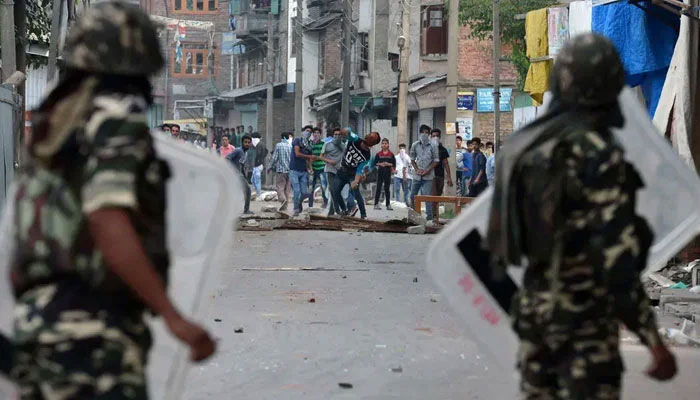Justice for Kashmir
Occupied Kashmir is not merely a territorial dispute but an issue of the fundamental rights of its people
The latest remarks by India’s External Affairs Minister Subrahmanyam Jaishankar on Azad Jammu and Kashmir (AJK) are yet another example of India’s aggressive rhetoric and historical distortion of facts. Speaking at Chatham House in London, Jaishankar claimed that the Kashmir dispute would be solved once the "stolen part of Kashmir" -- referring to AJK -- was returned to India. Such statements are not only misleading but also an outright dismissal of international law and historical realities. The Foreign Office (FO) of Pakistan has rightfully rejected these claims, urging India instead to vacate the illegally occupied territories of Jammu and Kashmir, which have remained under its brutal control for 77 years. Occupied Kashmir is not merely a territorial dispute but an issue of the fundamental rights of its people. Despite India’s repeated assertions that the revocation of Article 370 in 2019 has resolved the Kashmir conflict, the reality on the ground tells a different story. The abrogation of Kashmir’s special status has only intensified the oppression of the Kashmiri people, exacerbating their struggles under India’s military occupation. The recent elections in Indian-occupied Kashmir cannot be considered a substitute for the Kashmiri people’s right to self-determination, as enshrined in multiple United Nations Security Council (UNSC) resolutions.
The UN High Commissioner for Human Rights, Volker Turk, recently expressed concern over India's continued human rights violations in Occupied Jammu and Kashmir, pointing out the use of restrictive laws, arbitrary detentions, and the harassment of journalists and activists. Such statements are reminders that, despite India's attempts to present itself as the world’s largest democracy, its actions in Occupied Kashmir are far from democratic. The systematic silencing of dissent in Kashmir, as well as in India’s northeastern state of Manipur, show an India in which deep-seated authoritarian tendencies are tolerated under the Modi government. And then we have the blatant hypocrisy of the international community, particularly Western nations. Eager to counter China’s influence, they have turned a blind eye to India’s war crimes in Kashmir -- and provided it an impunity it unleashes on the Kashmiris.
Pakistan has consistently called upon the global community to recognise and act against India’s abuses in the region. However, as long as economic and geopolitical interests take precedence over human rights, Kashmiris will continue to suffer in silence. Under Modi’s leadership, India has not only intensified its suppression in Occupied Kashmir but has also engaged in extrajudicial killings and assassination attempts beyond its borders. The assassination attempts in Canada, the US and the UK are disturbing examples of just how emboldened the Modi regime has become, knowing well that it can escape repercussions due to its strategic importance to the West. Had any other country attempted what India did on foreign soil, severe sanctions and diplomatic isolation would have followed. Instead, India has merely received a slap on the wrist. The global community must stop looking at India solely through the lens of countering China and recognise the dangers posed by its unchecked expansionism and human rights abuses. Justice for Kashmir cannot be delayed indefinitely.
-
 Eric Dane Got Honest About His Struggle With ALS In Final Public Appearance: 'No Reason To Be In A Good Spirit'
Eric Dane Got Honest About His Struggle With ALS In Final Public Appearance: 'No Reason To Be In A Good Spirit' -
 Google AI Overviews And Mental Health: Why Experts Say It’s ‘very Dangerous’
Google AI Overviews And Mental Health: Why Experts Say It’s ‘very Dangerous’ -
 Prince Harry Issues A Statement For His 'incredible' WellChild Children
Prince Harry Issues A Statement For His 'incredible' WellChild Children -
 5 Famous Celebrities Who Beat Cancer
5 Famous Celebrities Who Beat Cancer -
 Spinosaurus Mirabilis: New Species Ready To Take Center Stage At Chicago Children’s Museum In Surprising Discovery
Spinosaurus Mirabilis: New Species Ready To Take Center Stage At Chicago Children’s Museum In Surprising Discovery -
 ByteDance Expands Artificial Intelligence Operations In US
ByteDance Expands Artificial Intelligence Operations In US -
 Angelina Jolie’s Breast Cancer Surgeon Appreciates Her For Calling Scars 'a Choice': 'They Are Choices To Survive'
Angelina Jolie’s Breast Cancer Surgeon Appreciates Her For Calling Scars 'a Choice': 'They Are Choices To Survive' -
 Detective Chief Inspector Reveals How Andrew Got Treated In Police Custody
Detective Chief Inspector Reveals How Andrew Got Treated In Police Custody -
 Gemini 3.1 Pro Unveiled: Google’s Next-gen AI For Advanced Reasoning & Faster Enterprise Workflows
Gemini 3.1 Pro Unveiled: Google’s Next-gen AI For Advanced Reasoning & Faster Enterprise Workflows -
 Oprah Winfrey Talks About Weight-loss 'tool To Manage' Health
Oprah Winfrey Talks About Weight-loss 'tool To Manage' Health -
 Texas Emerges As World's Future Data Center Capital
Texas Emerges As World's Future Data Center Capital -
 South Korea’s Ex-President Yoon Issues Public Apology After Being Sentenced To Life Over Martial Law
South Korea’s Ex-President Yoon Issues Public Apology After Being Sentenced To Life Over Martial Law -
 Eric Dane Recorded Episodes For The Third Season Of 'Euphoria' Before His Death From ALS Complications
Eric Dane Recorded Episodes For The Third Season Of 'Euphoria' Before His Death From ALS Complications -
 Inside Morning Of Andrew’s Arrest And How He Responded: ‘Do You Know Who I Am?’
Inside Morning Of Andrew’s Arrest And How He Responded: ‘Do You Know Who I Am?’ -
 OpenAI Sam Altman Predicts AI Superintelligence By 2028: Is Humanity Ready For A Turning Point?
OpenAI Sam Altman Predicts AI Superintelligence By 2028: Is Humanity Ready For A Turning Point? -
 WhatsApp Rolls Out Group Message History To Ease Group Chats
WhatsApp Rolls Out Group Message History To Ease Group Chats




